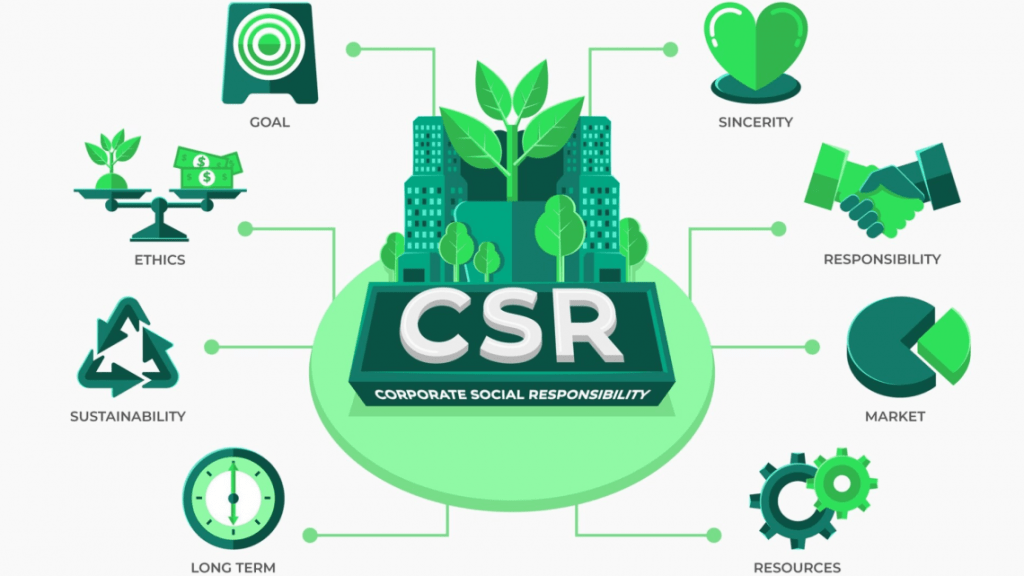Corporate social responsibility (CSR) has become an essential component of modern corporate operations. Companies that adopt CSR not only benefit society and the environment, but also improve their brand reputation and sustainability. In today’s linked world, businesses are increasingly understanding the importance of incorporating CSR into their operations to address major societal and environmental issues while guaranteeing long-term corporate success.
As a result, firms must implement successful CSR initiatives that are in line with their core beliefs and business objectives. To do this, organizations can use a number of best practices to maximize the beneficial impact of their CSR programs while avoiding any risks and problems. Here are some essential best practices for creating successful CSR strategies:

1: Align CSR with Business Values
Adopt CSR efforts that are consistent with your company’s basic beliefs and mission. By integrating CSR initiatives with your business goals, you may assure authenticity and long-term commitment to social and environmental issues. This strategic integration not only boosts your company’s credibility, but it also promotes substantial and long-term contributions to societal and environmental well-being.
2: Engage Stakeholders
Involve stakeholders, like as employees, customers, suppliers, and local communities, in CSR decision-making. Stakeholder engagement promotes collaboration, trust, and ensures that CSR activities address important social and environmental challenges. By actively incorporating stakeholders in CSR decision-making, businesses can gain valuable insights, perspectives, and knowledge from a variety of stakeholders, increasing the relevance and effectiveness of their CSR initiatives.
Furthermore, stakeholder involvement encourages transparency and responsibility, which strengthens partnerships between firms and the larger ecosystem. This collaborative approach not only improves the CSR strategy, but also fosters stakeholder ownership and commitment. This results long-term benefits and beneficial social impact. Businesses should prioritize meaningful stakeholder involvement as a cornerstone of their CSR efforts, recognizing its critical role in achieving shared aims and values.
3: Set Measurable Goals
Set specific and quantifiable goals for your CSR initiatives. Define key performance indicators (KPIs) to monitor progress and assess the effectiveness of your efforts. Setting specific goals fosters accountability and streamlines continuous improvement procedures. Explicit goal-setting promotes openness and allows for systematic monitoring of your CSR activities, guaranteeing alignment with business objectives. Businesses may successfully monitor their CSR performance and make educated decisions to achieve positive social and environmental impact by establishing clear goals and using KPIs.
4: Foster Transparency and Accountability
Maintain transparency by publicly disclosing your CSR efforts, goals, and outcomes to stakeholders. Regularly report on your progress and accept responsibility for your activities. Transparency fosters trust and confidence, hence increasing the effectiveness of CSR initiatives.
Businesses can demonstrate their commitment to accountability and ethical behavior by keeping communication channels open and releasing pertinent information. Transparency not only builds stakeholder relationships, but it also fosters increased participation and support for CSR projects. Organizations can foster trust, credibility, and goodwill by engaging in transparent reporting and disclosure processes, resulting in positive social and environmental outcomes.
5: Embrace Innovation with Corporate Social Responsibility
Encourage innovation and inventiveness in your CSR initiatives. Investigate creative approaches to addressing social and environmental issues, harness technology for beneficial impact, and work with partners to effect real change. Innovation enables businesses to keep ahead of changing CSR trends and make a stronger impact on society. Encourage experimentation and unusual thinking in order to discover unique solutions to challenging problems. Encourage staff to think outside the box and adopt fresh ideas that challenge standard CSR practices. Create a supportive environment in which innovation is encouraged, rewarded, and integrated into your organization’s CSR strategy. Businesses may optimize their effect and contribute to a more sustainable and socially responsible future by taking new approaches and implementing forward-thinking projects.
FAQs about Corporate Social Responsibility
🤔 What is Corporate Social Responsibility (CSR)?
Answer: CSR refers to a company’s commitment to operating in a way that is sustainable and ethical while also benefiting society and the environment.
🤔 Why is CSR important for businesses?
Answer: CSR is vital to businesses because it improves brand reputation, attracts and retains consumers and workers, reduces risks, and contributes to long-term success.
🤔 How can companies measure the impact of their CSR initiatives?
Answer: Companies can monitor the impact of their CSR programs by recording key performance indicators (KPIs), conducting stakeholder surveys, and comparing results to predetermined goals and objectives.
🤔 What are some examples of CSR activities?
Answer: CSR activities involve philanthropy, environmental sustainability, ethical procurement and supply chain management, employee volunteer programs, and community engagement projects.
🤔 How can small businesses implement CSR practices?
Answer: Small firms can adopt CSR practices by establishing their core values and priorities, launching small-scale initiatives, leveraging relationships and resources, and involving staff and consumers in CSR efforts.

Summary of Corporate Social Responsibility
To summarize, implementing best practices for Corporate Social Responsibility (CSR) is both a moral imperative and a smart commercial decision. Companies that align their CSR efforts with their core values, engage stakeholders, set measurable goals, foster transparency and accountability, and embrace innovation can have a meaningful and long-term positive impact on society and the environment while also improving their brand reputation and sustainability. As organizations face increasingly complex social and environmental concerns, integrating CSR into their operations will be critical to long-term success and resilience. Companies can help establish a more sustainable and fair future for all stakeholders by working together and adhering to CSR standards.








